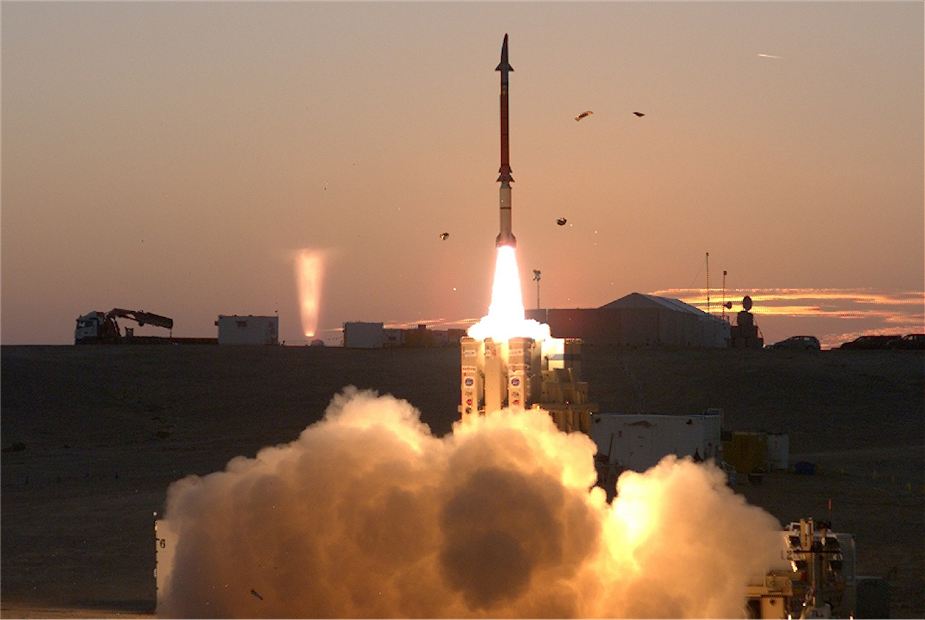Opinion/Arrow 3 Missile Test Ties Israel’s Hands on Striking Iran – Just as Trump Intended
أزريل برمنت/هآرتس: التطور الهائل في قدرة انظمة ردع الصواريخ الإسرائيلية-الإميركية عطل مبررات أي ضربة استباقية على إيران
Azriel Bermant/Haaretz/August 01/2019
Israel’s missile defenses, developed in partnership with the U.S., are now so effective that it will be far harder to justify a pre-emptive strike against Iran’s nuclear facilities.
On 28 July, Israel and the United States announced with great fanfare that they had carried out a successful series of tests of the advanced Arrow 3 missile defense system in Alaska.
Israel’s Prime Minister Benjamin Netanyahu claimed that the tests “were successsful beyond any imagination…Today Israel has the ability to act against ballistic missiles that could be launched against us from Iran or anywhere else.”
Boaz Levy, a senior official in Israel’s aerospace industries, went even further, claiming that the successful tests would mean that Israelis “would now be able to sleep better at night.”
This should be good news. For many years, U.S. officials have claimed that their funding, development and deployment of missile defenses are not just designed to protect allies, but also a means to enhance stability and disincentivize the use of military force. They are intended to dissuade an adversary from attacking a potential victim state, since its missile threat will be devalued – while the aggressor will still be exposed to retribution.
From this perspective, Iran would have a tremendous amount to lose if it were to directly attack an Israel that is well protected by its missile defenses. It was surely not coincidental that the Arrow-3 announcement was made just days after Iran had tested its Shahab-3 medium-range ballistic missile.
However, Netanyahu and his defense officials should be careful not to exaggerate Israel’s missile defense capabilities, present and future.
Netanyahu’s rhetoric echoes that of President Trump, who claimed earlier this year that the goal of U.S. missile defenses is to “detect and destroy any missile launched against the United States – anywhere, anytime, anyplace.”
Effective missile defenses should complicate the planning of Israel’s adversaries, but there is no such thing as a hermetic missile defense system.
To be sure, the Iron Dome defense system has been widely viewed as a great success in intercepting rockets from Gaza in 2012 and 2014, as well as during more recent rounds of fighting between Israel and Hamas. Missile defense has become a core element of Israel’s approach in defending the country, alongside offensive capabilities and passive defense.
The main threat to Israel’s cities in a future war scenario comes from the large missile forces in the hands of Iran and Hezbollah in Lebanon.
Israeli military planners have therefore placed an increasing emphasis on the development of multiple layers of defensive capabilities in facing missile and strategic threats from its enemies. Systems such as Iron Dome, David’s Sling and the Arrow 3 are viewed in Israel as a means to protect key strategic installations and Israeli population centers as well as to enhance stability and de-escalation efforts.
From an Israeli perspective, however, these systems are also of great psychological importance in view of their potential to strengthen the morale of the Israeli public in a situation of crisis or war. Iron Dome was key to strengthening the resolve of the Israeli public during the 2012 and 2014 conflicts.
However, in a scenario of war with Iran or Hezbollah, the threat facing Israel is more complex and acute. During Israel’s military confrontations with the Palestinians in Gaza, many of its interceptors were not utilized, since the Iron Dome system was able to detect that a large proportion of enemy rockets would not reach population centers.
But if Israel were to face a war on numerous fronts, with its adversaries firing hundreds of ballistic missiles a day, the onslaught would be enough to saturate even the most effective missile defense system.
There is also a concern that Iran could add ballistic missile warheads and decoys at a significantly lower cost than Israel could add missile defense interceptors. Israel will have to prioritize the location of its missile defense systems. Safeguarding strategic and military installations will surely be a higher priority than the protection of population centers. Israel will not have the luxury of defending all of its locations at the same time.
Yet some of Israel’s defense officials are now suggesting that the advances in missile defense capabilities give Israel the upper hand in the race to counter Iran’s missile development. According to U.S. intelligence assessments, Iran would be most likely to deliver a nuclear weapon by means of a ballistic missile.





















